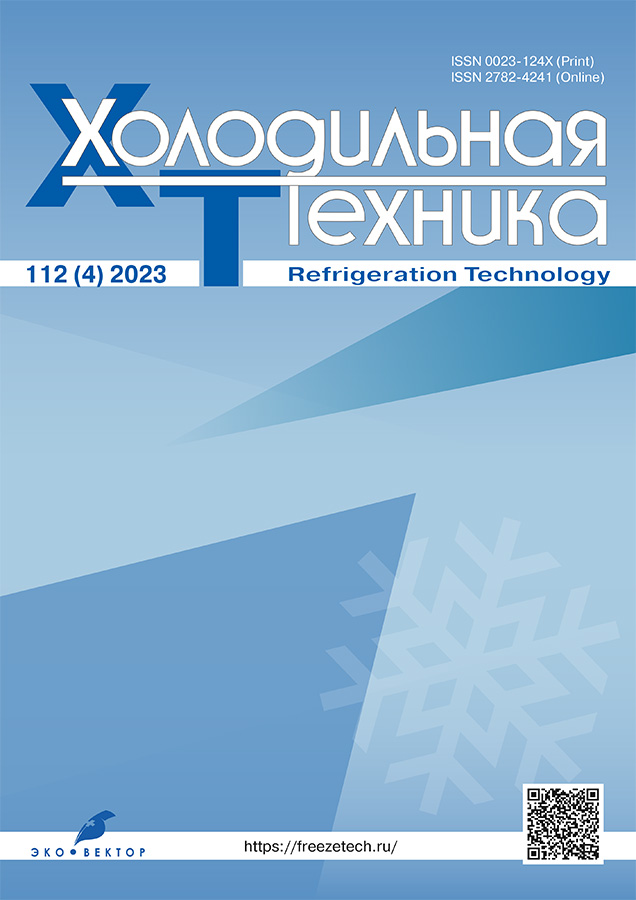Safety and reliability assessment of CO₂ refrigeration system for underground applications below -50 °C
- Authors: Barroca P.1, Verlaat B.1, Hafner A.1, Blust S.1, Hulek W.2, Zwalinski L.2, Teixeira D.3
-
Affiliations:
- Department of Energy and Process Engineering NTNU
- CERN
- University of Cape Town
- Issue: Vol 112, No 4 (2023)
- Pages: 237-246
- Section: Original Study Articles
- URL: https://freezetech.ru/0023-124X/article/view/635386
- DOI: https://doi.org/10.17816/RF635386
- ID: 635386
Cite item
Abstract
A new CO₂ refrigeration concept is evaluated to cool the ATLAS and CMS experiments installed close to 100 m underground, at the Large Hadron Collider (LHC) at CERN. The first prototype unit produced to validate the conceptual design and to assess safety and reliability of the system has been commissioned. This paper presents results obtained, discusses the safety and reliability of the system and discourses on the list of recommendations for the future final units to cover the cooling loads of 380 kW for ATLAS and 750 kW for CMS at -53 °C evaporation temperature.
This article is a translation of the article by Barroca P, Verlaat B, HafnerA, Blust S, Hulek W, Zwalinski L, Teixeira D. Safety and reliability assessment of CO₂ refrigeration system for underground applications below -50 °C. In: Proceedings of the 9th IIR Conference on the Ammonia and CO₂ Refrigeration Technologies. Ohrid: IIF/IIR, 2021. DOI: 10.18462/iir.nh3-co2.2021.0024 Published with the permission of the copyright holder.
Keywords
Full Text
About the authors
Pierre Barroca
Department of Energy and Process Engineering NTNU
Author for correspondence.
Email: pierre.a.c.barroca@ntnu.no
Norway, 7491, Trondheim
Bart Verlaat
Department of Energy and Process Engineering NTNU
Email: bart.verlaat@cern.ch
Switzerland, 7491, Trondheim
Armin Hafner
Department of Energy and Process Engineering NTNU
Email: armin.hafner@ntnu.no
Norway, 7491, Trondheim
Stephanie Blust
Department of Energy and Process Engineering NTNU
Email: stefanie.blust@ntnu.no
Norway, 7491, Trondheim
Wojciech Hulek
CERN
Email: lukasz.zwalinski@cern.ch
Switzerland, Geneva
Lukasz Zwalinski
CERN
Email: lukasz.zwalinski@cern.ch
Switzerland, Geneva
Daniella Teixeira
University of Cape Town
Email: TXRDAN001@myuct.ac.za
South Africa, Cape Town
References
- Verlaat B, Van Lysebetten A, Van Beuzekom M. CO₂ cooling for the LHCb-VELO Experiment at CERN. In: 8th IFF/IRR Gustav Lorentzen Conference on Natural Working Fluids. Copenhagen; 2008.
- Zwalinski L, Bortolin C, Blaszczyk T, et al. CO₂ cooling system for Insertable B Layer detector into the ATLAS experiment. Amsterdam: TIPP; 2014.
- Daguin J, et al. CO₂ cooling for particle detectors: experiences from the CMS and ATLAS detector systems at LHC, and prospects for future upgrades. In: Proceedings of the 24th IIR International Congress of Refrigeration. Yokohama; 2015.
- Petagna P, Verlaat B, Francescon A. Two-Phase Thermal Management of Silicon Detectors for High Energy Physics. In: Encyclopedia of Two-Phase Heat Transfer and Flow III. 2015:335–412. doi: 10.1142/9789813229471_0005
- Barroca P., Hafner A., Pardiñas A., et al. Evaporative cooling system with natural refrigerant at -50 ℃ and 100 m underground. In: Proceedings of 14th Gustav Lorentzen Conference. Kyoto; 2020.
Supplementary files













